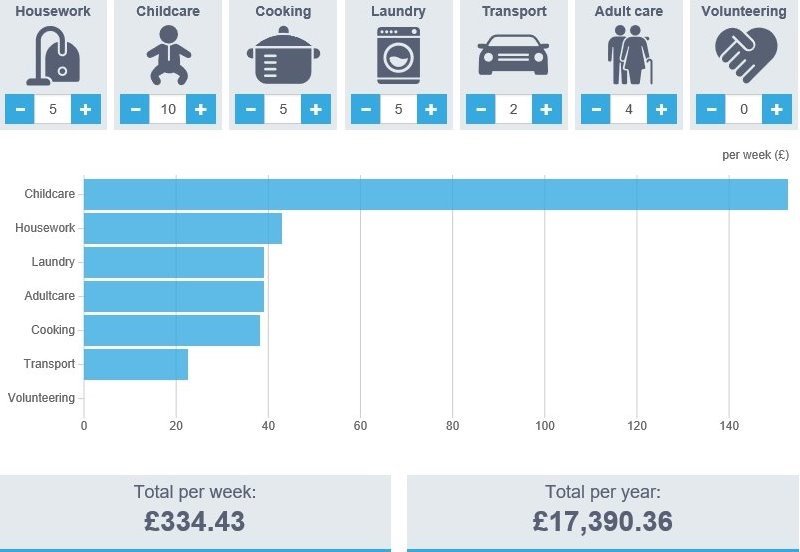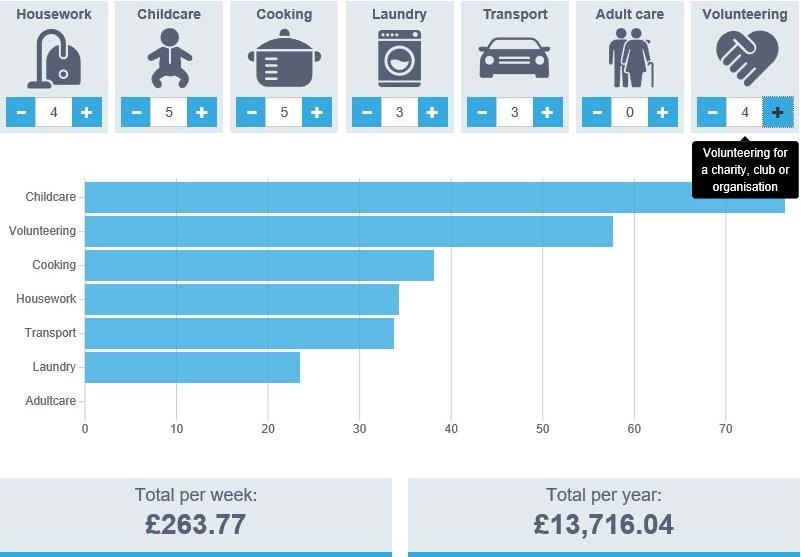Unpaid Work
The Office for National Statistics has released a calculator for those who want to calculate their net worth to the household wealth. The calculator is here, and will calculate the value of the ‘Unpaid Work’ done around the home as if it were paid employment.
Equal Contribution to the Family
At Paradigm Family Law, we wondered how it might apply to stay at home parents or the party to a divorce who has not worked in a traditional employer/employee capacity but has nevertheless made an equal contribution to the household.
We are talking specifically of the scenario within the factors set out under S.25 Matrimonial Causes Act 1973 as highlighted below:
(a) the income, earning capacity, property and other financial resources which each of the parties to the marriage has or is likely to have in the foreseeable future, including in the case of earning capacity any increase in that capacity which it would in the opinion of the court be reasonable to expect a party to the marriage to take steps to acquire;
(b) the financial need obligations and responsibilities which each of the parties to the marriage has or is likely to have in the foreseeable future;
(c) the standard of living enjoyed by the family before the breakdown of the marriage;
(d) the age of each party to the marriage and the duration of the marriage;
(e) any physical or mental disability of either of the parties to the marriage;
(f) the contributions which each of the parties has made or is likely in the foreseeable future to make to the welfare of the family, including any contribution by looking after the home or caring for the family;
(g) the conduct of each of the partie if that conduct is such that it would in the opinion of the court be inequitable to disregard it;
(h) in the case of proceedings for divorce or nullity of marriage, the value to each of the parties to the marriage of any benefit . . . which, by reason of the dissolution or annulment of the marriage, that party will lose the chance of acquiring
Show me the Money
We thought we’d try some worked examples. Take the following 2 scenarios (and applying only to a 40 hour 5 day week – which we admit is perhaps too optimistic!):
Scenario 1
Stay at home mother, 2 children under 5 years with an elderly father-in-law living nearby who needs help with a bit of shopping. She spends at least 5 hours a week doing household chore 2 hours travelling to see her father-in-law and when her partner is not at home is otherwise looking after the children, cooking and doing the laundry.
Housework 5 hours
Childcare 10
Cooking 5
Laundry 5
Transport 2
Adult Care 4
Scenario 2
Single parent father, whose son attends his nearby Junior School. He works part – time during school hour and also helps out as a volunteer once a week for the local Scout Group. He spends 4 hours per week volunteering and when he is not working or helping the Scout he is cooking and cleaning and doing the laundry for the pair of them at home.
Housework 4
Childcare 5
Cooking 5
Laundry 3
Transport 3
Volunteering 4
What are you worth?
Why don’t you try for yourself…..? We would love to hear from you with your unpaid work calculations. It would be great to have enough examples together to show any trend patterns and who knows where it will take us. We might even be able to use the data when asking the court to account for the contributions made by a party in divorce proceedings.
Contact
Paradigm Family Law have a team of experienced and highly recommended divorce lawyers to help guide you through the process of divorce, just waiting to hear from you.
If you would like more details on this or want to discuss your family law matter, please do not hesitate to contact Frank or Evelyn. Paradigm Family Law offers a free initial consultation with a top rated divorce lawyer and our fixed fee solutions cover financial proceedings from start to finish. You can call us on 01904 217225 or email us to info@paradigmfamilylaw.co.uk.




